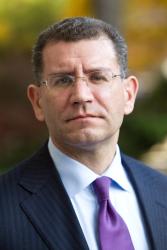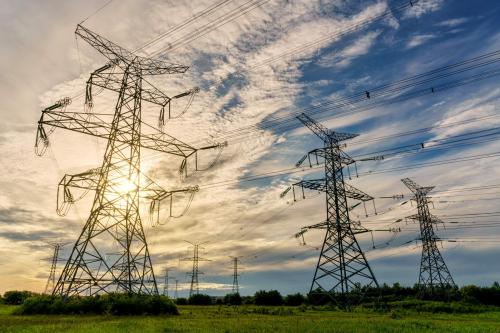

LIVE
Should the United States change its policies around Taiwan?12:30 pm EDT - 2:00 pm EDT
Past Event
12:30 pm - 2:00 pm EDT
1775 Massachusetts Avenue, N.W.
Washington, DC
20036
Steadily rising prices of oil have triggered a massive influx of capital into the Gulf Cooperation Council (GCC) states – Bahrain, Kuwait, Saudi Arabia, Oman, Qatar and the UAE. While the mounting oil revenues continue to generate an unprecedented economic boom in the GCC states, they also pose multifarious challenges to their leaders and the global financial markets. In particular, how can Gulf states effectively manage their new wealth? In what ways will the decisions made by the GCC leaders affect the international markets and liquidity? Can the benefits of this economic surge be exploited to promote democracy and reform in the broader Middle East?
To evaluate the advantages and risks associated with increasing oil wealth in GCC countries, the Saban Center for Middle East Policy at Brookings convened a policy forum discussion on May 12, 2008 with Fareed Mohamedi, Partner and Head of Markets and Country Strategies at PFC International, and Jean-Francois Seznec, Visiting Professor at Georgetown University’s Center for Contemporary Arab Studies.
Both Mohamedi and Seznec shared a degree of optimism about the sustainability of current economic growth trends and the resulting potential for development in the region. In his opening remarks, Mohamedi corroborated his optimism by asserting that Gulf governments have been implementing sound economic development strategies that date back to before the rise of oil prices. In Saudi Arabia, Mohamedi observed, the turbulent political phase that the Kingdom experienced in the 1990s, due predominantly to poor finances, compelled the government to institute a strategy for economic development. The East Asian model of successful economic transformation (which occurred between the 1960s and 1990s) has served as a feasible paradigm for the Gulf states, Mohamedi argued. In particular, he emphasized that the symbiosis of authoritarianism and market capitalism which, in his opinion, enabled substantive economic transformation of the Asian countries, has been gradually applied in the Gulf.
While effective governance is a cornerstone of economic development, Mohamedi pointed out that it is not the only prerequisite. In this regard, he expressed concern about the private sector in Gulf countries. Mohamedi highlighted the tendency in some Gulf states to transfer oil revenues to European banks instead of reinvesting these funds in domestic economies. This approach, according to Mohamedi, does not promote macro-economic stability. Saudi Arabia, in contrast, has recognized the inefficacy of saving money in European bank accounts, and has therefore initiated projects such as the National Gas Initiative. This has sent a message to both domestic and international entrepreneurs that Saudi Arabia is improving its environment for domestic and foreign investments.
Mohamedi accentuated that domestic reinvestment is vital for sustainable growth and analyzed the case of the United Arab Emirates to illustrate his point. He noted that in the UAE the private sector has become a catalyst for change and innovation. For instance, vigorous private-sector activities have forged robust public-private partnership which, in turn, have bolstered economic growth. In his view, the amalgam of sound macroeconomic policies, strong technocratic capacity, and improved regulatory environment fostered economic growth and stability in the United Arab Emirates. The United Arab Emirates, according to Mohamedi, has thus become a quintessence of the Asian model in the Gulf.
Turning to Saudi Arabia, Mohamedi observed that the Kingdom is on a similar trajectory. As the country has embarked on improving its domestic environment for investments and has adopted responsible fiscal policies, it has strengthened its private sector. Increasingly, nascent private companies reinvest in Saudi Arabia and collaborate with the public sector. Partnership of the public and private sectors, Mohamedi emphasized, is the key to sustainable economic growth. Of equal significance, he observed, is the fact that public-private collaboration often drives innovations that, in turn, foster development. Mohamedi identified Islamic banking as a successful example of innovation in the region. The notion of Islamic banking – which only a few years ago was perceived with a significant degree of skepticism in economic circles – has proven viable in the Gulf. Mohamedi pointed out that the introduction of this new regulatory system that differs significantly from western banking is an example of a successful innovation that has already been partly adopted in other parts of the world, including in Malaysia and Kazakhstan. Mohamedi concluded that growing oil wealth has the potential to transform the economies of the Gulf states and, of greater significance, produce positive spillover into the broader Middle East and North Africa.
Jean-Francois Seznec shared Mohamedi’s optimistic projections for the Gulf region, but centered his analysis on the role of leadership in managing oil wealth and the various strategies pursued by the Gulf leaders. In his view, the massive industrial growth in Saudi Arabia has been caused not only by the abundance of cheap energy, but also by the effective decisions made by Saudi leaders. In particular, Seznec pointed to the shift in the Gulf economies away from crude oil production towards value-added production. According to Seznec, Saudi Arabia epitomizes this strategy in practice. Seznec argued that the Saudi leaders’ pursuit of a strategy to conserve energy for value-added production has enabled Saudi Arabia to become one of the five largest producers of petrochemicals in the world, thereby further shifting the Saudi economy away from crude oil production. He forecast that by 2015 Saudi Arabia will become the largest producer of chemicals in the world, and the overall Gulf region will likely develop into the largest international producer of aluminum by 2020.
Seznec cautioned that while the progress will undoubtedly benefit the region, it may also pose challenges for the Gulf societies, including the possibility of high inflation and increased dependence on foreign workers from India and other parts of the world. Seznec argued that as the Gulf economies move towards value-added production they will develop strong ties with China and India. Such a scenario would be a strategic downside for the United States if it entailed a drastic decline in cooperation between the United States and the Gulf countries. Seznec noted that the unpopularity of American policies in the region may foster this trend toward collaboration with China and India over the United States. Seznec concluded that while provision of security and stability in the region remain important to the Gulf leaders, they place increasing emphasis on strengthening their economies.


Robin Brooks
April 11, 2024

March 6, 2024

Jonathan Wilkinson
March 6, 2024